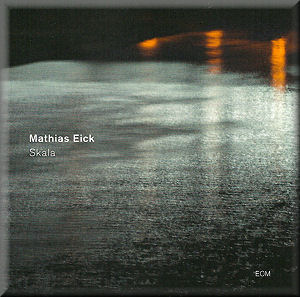1. Skala
2. Edinburgh
3. June
4. Oslo
5. Joni
6. Biermann
7. Day After
8. Epilogue
Mathias Eick - Trumpet, vibes, electric guitar, double bass
Andreas Ulvo - Piano
Tore Brunborg - Tenor sax (tracks 1, 7)
Morten Qvenild - Keyboards (tracks 1, 4, 5)
Audun Erlien - Electric bass (tracks 1, 2, 4-7)
Torstein Lofthus, - Drums (tracks 1, 2, 4-8)
Gard Nilssen - Drums (tracks 1, 2, 4, 6)
Sidsel Walstad - Harp (track 3)
Mathias Eick wrote all the compositions on this album and he says they were inspired "by music from classical to pop". It is perhaps significant that the word "jazz" is not mentioned, although it is clear that Eick models himself - at least in terms of tone - on trumpeters like Kenny Wheeler and Chet Baker.
His trumpet certainly has the attractive tone of such players, although at times it makes him sound more like a middle--of-the-road artist such as Herb Alpert. And his music betrays the influence of pop artists like Elton John, Sting and Radiohead. His trumpet playing dominates the album and it is lyrical without being memorable: superficially attractive but lacking substance.
Most tracks fall into the trap of being based on repetitive riffs. This repetition not only becomes tiresome for the listener but it tends to serve as a substitute for genuine melody. Such ostentatious ostinati have become all too common in the work of many so-called jazz artists, who seem to drift farther and farther away from the core elements of jazz. Even Mathias says of The Day After: "The beat is definitely retrospective - not much connection to jazz".
I have listened to this CD several times and made detailed notes about each track, but my comments turned out to be almost as repetitious as the music itself. Nearly every track could be described as Eick's trumpet floating sweetly but insubstantially above reiterated phrases. The fragmentary melodies are barely enough to lift this album above the category of background music or "easy listening".
Tony Augarde
www.augardebooks.co.uk
